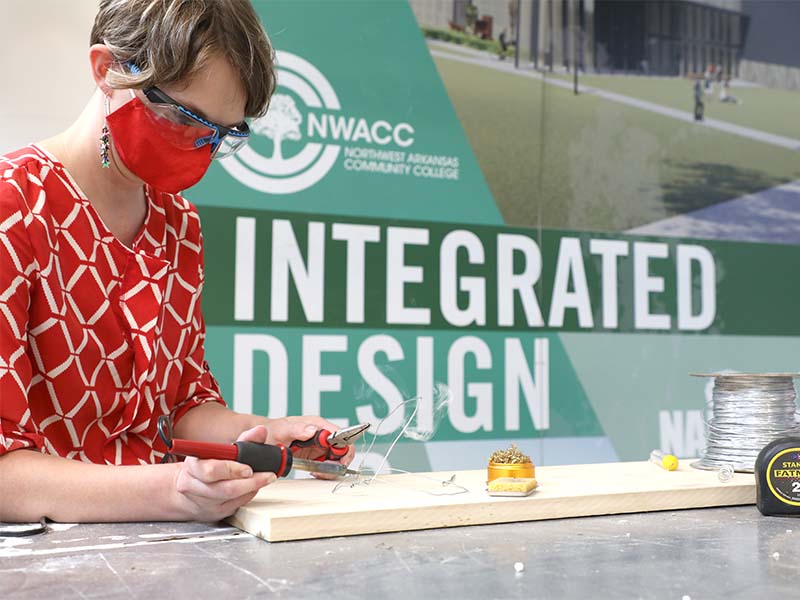Main Content Start
NWACC Expands Integrated Design Program with NSF ATE Grant

In a matter of years, NWACC moved from its first discussions about integrated design to breaking ground, building an integrated design lab and launching a design-thinking curriculum. Much of NWACC’s ability to expand its integrated design program, add additional equipment to the lab, and grow community partnerships has been due to the half-a-million National Science Foundation (NSF) Advanced Technological Education (ATE) project grant awarded to the college in March of 2020.
The following offers insight on what exactly is integrated design, the college’s design-thinking
curriculum and how grant funding is making this important program accessible to a
growing NWA population.
Integrated Design Defined
Integrated design can be described as a creative and holistic approach to the use of design to problem solve and tackle real-world challenges. By pursuing an education in integrated design at NWACC, students learn how to design, create and innovate through artistic creativity, design-thinking principles, construction methods, and business practices, and in turn, make change in their work, the community or even the world.
Integrated Design Certificate
NWACC offers a Technical Certificate in Integrated Design which brings together form and function in a way that shows value-added work toward a degree. Using the language and principles of design-thinking, students learn how functional design can make a positive impact. The certificate stands on its own or stacks into one of three degrees: an Associate of Fine Arts (AFA), an Associate of Applied Science (AAS) in Construction, or an Associate of Applied Science in Computer-Aided Design.
Integrated Design Lab
The structure of NWACC’s Integrated Design Lab (IDL) is based on Bauhaus, an early 1900’s German art school and philosophy, famous for its approach to design and attempt to unify the principles of mass production with individual artistic vision, combining aesthetics with everyday function. Through the building’s intentional connection points between the art, construction and computer-aided design (CAD) labs, design-based problem solving produces maximum impact and inspiration.
Along with art, construction and CAD courses, the lab also offers a dedicated makerspace for collaboration, design testing and innovation. Students are able to gain valuable creative and technical skills in drawing, painting, ceramics, printmaking, construction and three-dimensional design media such as wood and metal, as well as digital tools of design, fabrication and 3D printing.
About NSF ATE Grant
The National Science Foundation (NSF) is an independent federal agency that supports fundamental research and education
across all fields of science and engineering. NSF funds reach all 50 states through
grants to nearly 2,000 colleges, universities and other institutions. The foundation’s Advanced Technological Education (ATE) program focuses on two-year Institutions of Higher Education (IHEs) and the education of technicians
for the high-technology fields that drive our nation's economy. The ATE program supports
curriculum development; professional development of college faculty and secondary
school teachers, career pathways and other activities.
Use of Grant Funds
Once NWACC received the $586,900 NSF ATE grant, the college began dedicating funding to further developing the design-thinking curriculum. The grant funded stipends for art, construction and CAD faculty to write and integrate the curriculum into their programs, creating a uniform design-thinking process that ties the three areas together and allows seamless collaboration. The program now includes a requirement to build one’s own professional and industry-approved design portfolio that can be shown to potential employers.
Grant money has also gone toward lab equipment purchases such as an electric kiln,
saber saw, router, electric potter’s wheels, jointer, planer and various hand tools.
The additional equipment is being used to support the student’s journey into becoming skilled workers within the design and fabrication fields, as well as being used in
community and educational outreach programming such as design-thinking workshops and
the recent Family Maker Night.
Future Plans for Grant Funding
NWACC plans to use funding to expand the community impact of the integrated design lab by forming strategic partnerships with area industry businesses and experts, as well other educational institutions. The college will be offering virtual hands-on, design-thinking workshops to youth groups such as the Girls Scouts, and plans to open its lab’s makerspace to various groups, including the Bentonville Schools Ignite Technology program, to promote broader access to the equipment required to fully develop both technological and artistic projects.
The college is also finalizing an advisory board that will include representatives from the Amazeum, Crystal
Bridges, Nabholz, Startup Junkie and NWA Council to assist in the growth and impact
of the integrated design program.
Pursue a Certificate in Integrated Design
NWACC's spring enrollment is now open, making it an ideal time to pursue courses in integrated design. Enjoy learning how to design, create and innovate through artistic creativity, design-thinking principles, construction methods and business practices, and in turn, make positive change in your life, career and community.